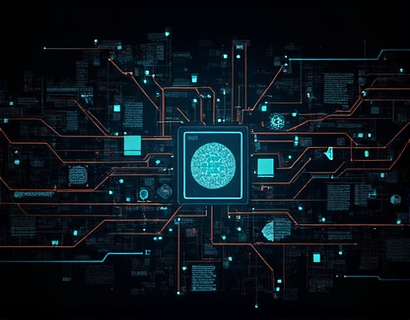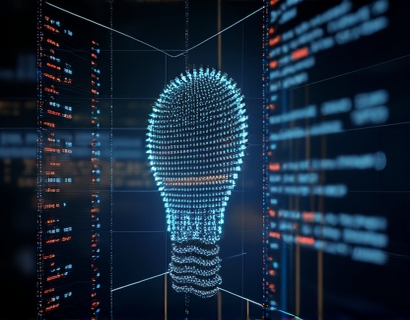Unleashing Next-Gen Productivity with AI and Crypto: A Deep Dive into Transformative Digital Solutions
The intersection of artificial intelligence (AI) and cryptocurrency is giving birth to a new era of digital productivity, where advanced technologies are redefining how we approach workflows and daily tasks. This article delves into the profound impact of these technologies, offering tech innovators and early adopters a comprehensive look at the next generation of seamless and efficient digital solutions. By exploring the synergy between AI and cryptocurrency, we aim to provide insights into how these tools are not only enhancing productivity but also opening up new possibilities for innovation and growth.
The integration of AI into various sectors has been transformative, but when combined with the decentralized and secure nature of cryptocurrency, the potential for revolutionizing digital productivity becomes even more significant. AI's ability to process vast amounts of data, learn from patterns, and make intelligent decisions is complemented by cryptocurrency's capacity to facilitate secure, transparent, and decentralized transactions. This combination is paving the way for smarter, more efficient, and more secure digital ecosystems.
Enhancing Workflows with AI-Powered Tools
AI-driven tools are already making significant inroads into enhancing workflows across different industries. From automating repetitive tasks to providing actionable insights through data analysis, these tools are streamlining processes and boosting productivity. For instance, AI-powered project management software can predict project timelines, allocate resources more efficiently, and even identify potential bottlenecks before they become issues. This proactive approach ensures that projects stay on track and meet their deadlines with minimal manual intervention.
In the realm of customer service, AI chatbots are becoming increasingly sophisticated, capable of handling complex queries and providing personalized experiences. These chatbots can operate 24/7, reducing response times and freeing up human agents to focus on more intricate tasks. The integration of natural language processing (NLP) and machine learning algorithms enables these chatbots to understand context and nuance, making interactions more natural and effective.
Cryptocurrency: A Secure Foundation for Digital Transactions
Cryptocurrency plays a crucial role in this ecosystem by providing a secure and decentralized medium for transactions. The inherent transparency and immutability of blockchain technology ensure that transactions are tamper-proof and verifiable, reducing the risk of fraud and errors. This level of security is particularly important in business environments where trust and reliability are paramount.
Moreover, the use of stablecoins, which are cryptocurrencies pegged to stable assets like the US dollar, offers a stable store of value and a reliable unit of account. This stability is essential for businesses looking to adopt cryptocurrency for everyday transactions, as it mitigates the volatility associated with other cryptocurrencies. The adoption of stablecoins in conjunction with AI-driven financial tools can lead to more efficient and secure financial operations.
Smart Contracts: Automating Agreements
One of the most exciting applications of blockchain technology is the use of smart contracts. These self-executing contracts with the terms directly written into code can automate a wide range of agreements and transactions. When combined with AI, smart contracts can become even more powerful, as AI can analyze conditions, predict outcomes, and execute actions based on predefined rules. For example, in supply chain management, smart contracts can automatically trigger payments once goods are delivered and verified, eliminating the need for intermediaries and reducing transaction costs.
The integration of AI with smart contracts also enhances their adaptability and intelligence. AI can monitor real-time data and adjust contract parameters dynamically, ensuring that agreements remain relevant and effective. This level of automation and intelligence not only speeds up processes but also reduces the potential for human error, leading to more reliable and efficient operations.
Data Privacy and Security: A Critical Component
As AI and cryptocurrency technologies advance, data privacy and security become increasingly critical. The combination of AI's data processing capabilities and cryptocurrency's decentralized nature offers a robust framework for protecting sensitive information. Blockchain's cryptographic techniques ensure that data is encrypted and accessible only to authorized parties, while AI can enhance security through advanced threat detection and response systems.
Privacy-focused cryptocurrencies, such as those utilizing zero-knowledge proofs, provide an additional layer of security by allowing transactions to be verified without revealing the underlying data. When paired with AI-driven security solutions, this creates a formidable defense against cyber threats. Businesses can leverage these technologies to build trust with their customers and partners, ensuring that their data remains secure and private.
Enhancing Decision-Making with AI and Crypto Insights
The synergy between AI and cryptocurrency also extends to decision-making processes. AI can analyze vast amounts of market data, including cryptocurrency trends, to provide insights that inform strategic decisions. For instance, AI algorithms can predict market movements, identify emerging trends, and recommend optimal investment strategies. This data-driven approach enables businesses to make more informed and timely decisions, giving them a competitive edge in the market.
Furthermore, the use of decentralized finance (DeFi) platforms, powered by blockchain and AI, is democratizing access to financial services. These platforms offer a range of financial products, from lending and borrowing to trading and yield farming, all accessible through smart contracts. AI can enhance these platforms by providing personalized financial advice, optimizing portfolios, and automating trades, making finance more accessible and efficient for a broader audience.
Challenges and Considerations
While the potential benefits of integrating AI and cryptocurrency are substantial, there are also challenges and considerations that need to be addressed. One of the primary concerns is the regulatory landscape, which is still evolving in both AI and cryptocurrency spaces. Navigating the complex and often conflicting regulations can be daunting for businesses looking to adopt these technologies. It is crucial for organizations to stay informed and comply with local and international regulations to avoid legal issues.
Another challenge is the technical complexity involved in integrating AI and cryptocurrency solutions. Developing and maintaining these systems requires specialized knowledge and expertise. Businesses may need to invest in training their staff or partnering with technology providers to ensure successful implementation. Additionally, the interoperability of different AI and blockchain platforms can be a hurdle, necessitating standards and protocols that facilitate seamless integration.
Future Prospects: A Vision for the Next Generation
Looking ahead, the future of digital productivity through AI and cryptocurrency is promising. As technologies continue to mature, we can expect even more innovative applications and integrations. The development of more advanced AI models, such as generative adversarial networks (GANs) and transformers, will further enhance the capabilities of AI-driven tools. These advancements will enable more sophisticated data analysis, content creation, and decision-making processes.
In the cryptocurrency space, the evolution of scalable and efficient blockchain networks, such as layer 2 solutions and cross-chain interoperability, will address some of the current limitations. This will make it easier for businesses to adopt and integrate cryptocurrency solutions into their operations. The rise of central bank digital currencies (CBDCs) and the increasing acceptance of cryptocurrencies by mainstream institutions also signal a more inclusive and widespread adoption of digital currencies.
The convergence of AI and cryptocurrency is not just about enhancing productivity; it's about creating a more transparent, secure, and efficient digital world. As these technologies continue to evolve, they will unlock new possibilities for innovation, collaboration, and growth. Tech innovators and early adopters who embrace these advancements will be well-positioned to lead the charge in this exciting new era of digital transformation.










































